人教版(2019) 选择性必修第三册 Unit 2 Healthy Lifestyle Reading and thinking字词句篇复习整合练习(含答案)
文档属性
| 名称 | 人教版(2019) 选择性必修第三册 Unit 2 Healthy Lifestyle Reading and thinking字词句篇复习整合练习(含答案) | 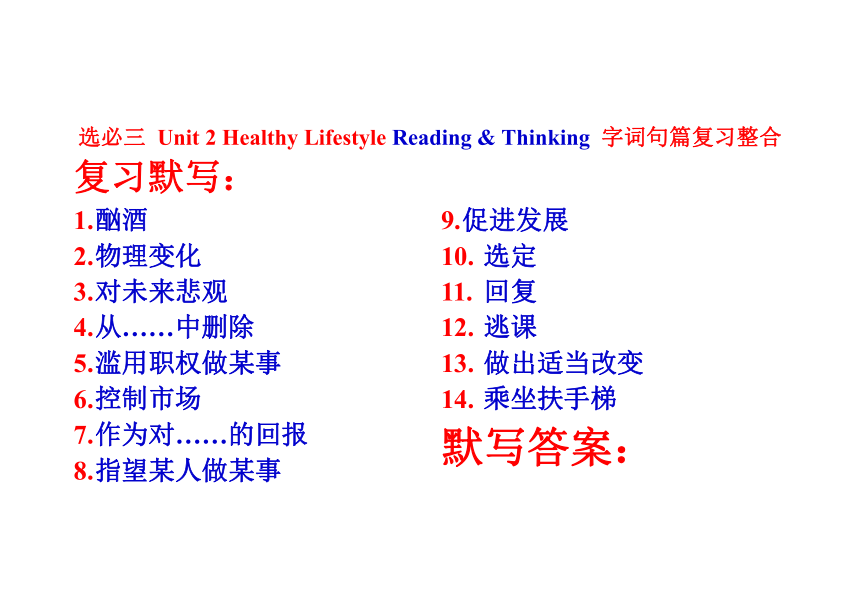 | |
| 格式 | docx | ||
| 文件大小 | 50.0KB | ||
| 资源类型 | 教案 | ||
| 版本资源 | 人教版(2019) | ||
| 科目 | 英语 | ||
| 更新时间 | 2022-04-07 19:04:13 | ||
图片预览

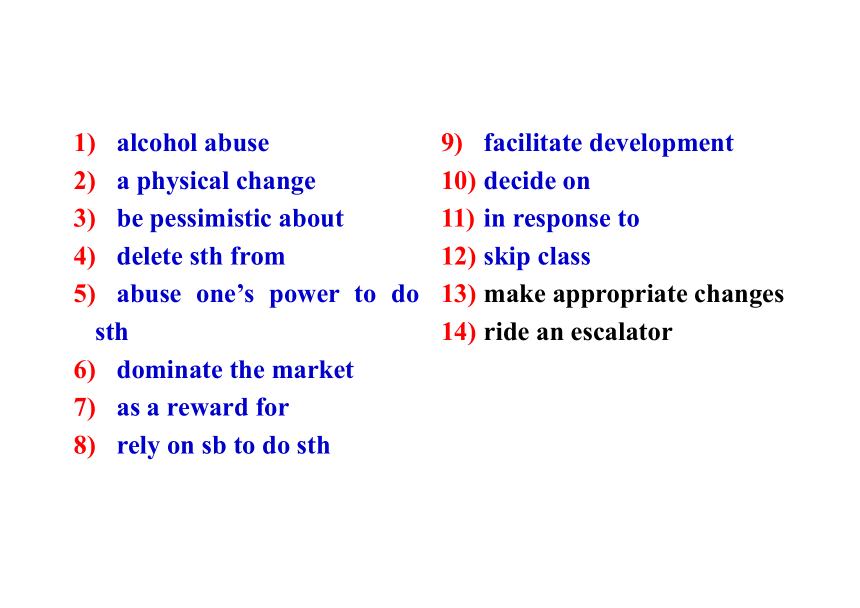
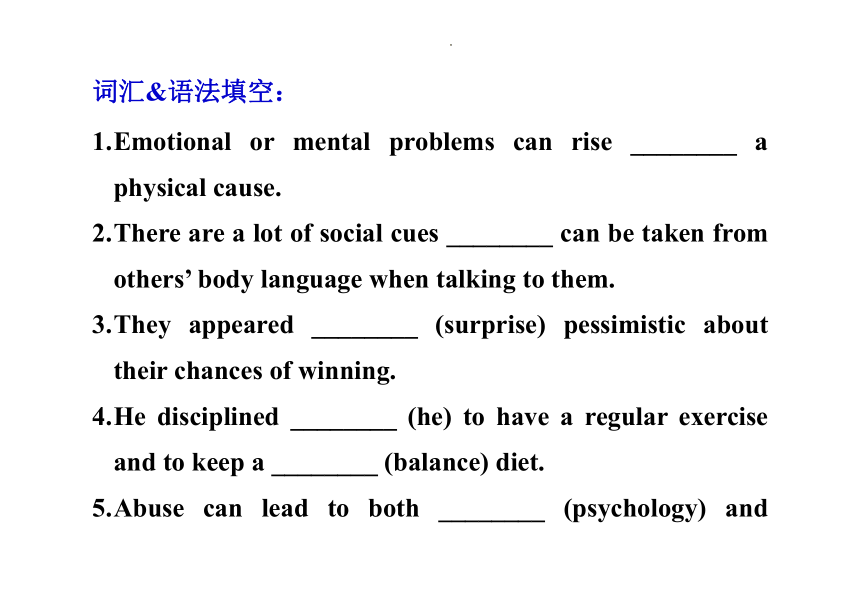
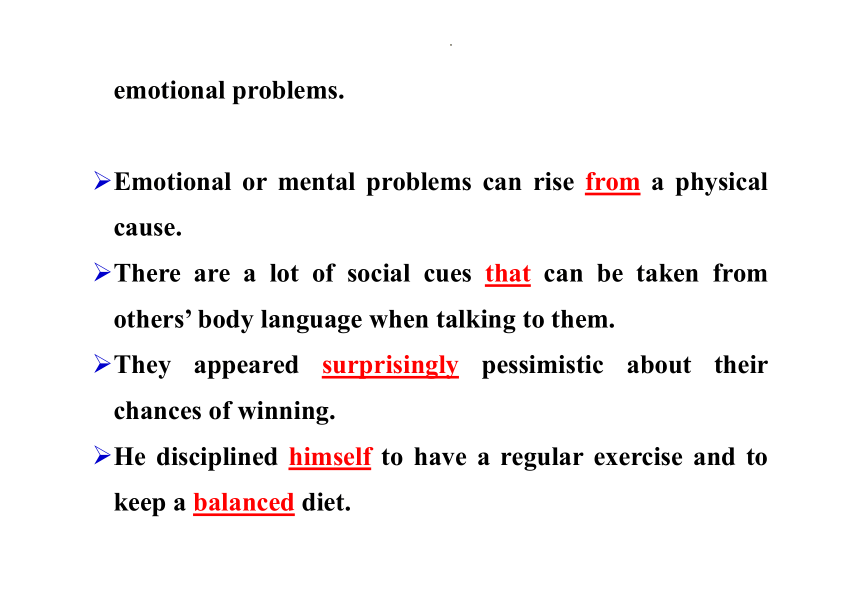
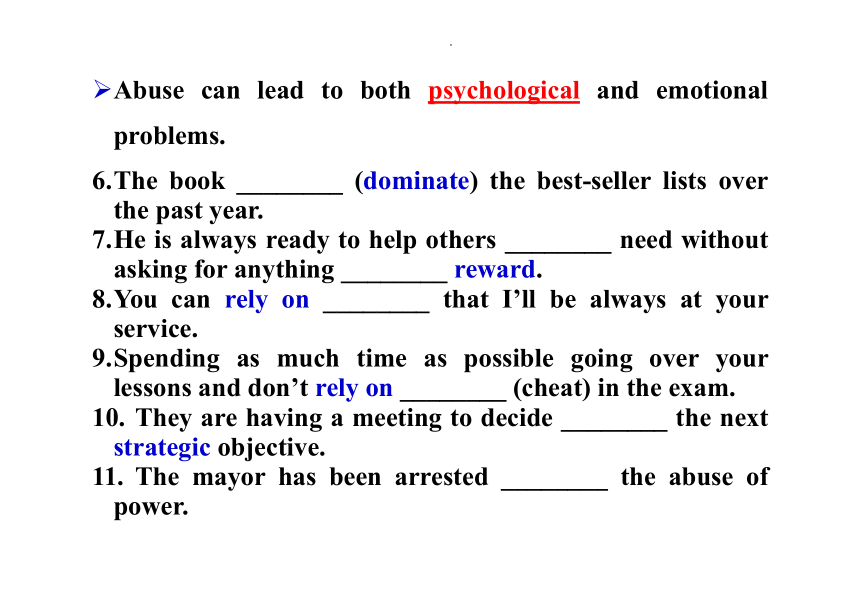
文档简介
选必三 Unit 2 Healthy Lifestyle Reading & Thinking 字词句篇复习整合
复习默写:
酗酒
物理变化
对未来悲观
从……中删除
滥用职权做某事
控制市场
作为对……的回报
指望某人做某事
促进发展
选定
回复
逃课
做出适当改变
乘坐扶手梯
默写答案:
alcohol abuse
a physical change
be pessimistic about
delete sth from
abuse one’s power to do sth
dominate the market
as a reward for
rely on sb to do sth
facilitate development
decide on
in response to
skip class
make appropriate changes
ride an escalator
词汇&语法填空:
Emotional or mental problems can rise ________ a physical cause.
There are a lot of social cues ________ can be taken from others’ body language when talking to them.
They appeared ________ (surprise) pessimistic about their chances of winning.
He disciplined ________ (he) to have a regular exercise and to keep a ________ (balance) diet.
Abuse can lead to both ________ (psychology) and emotional problems.
Emotional or mental problems can rise from a physical cause.
There are a lot of social cues that can be taken from others’ body language when talking to them.
They appeared surprisingly pessimistic about their chances of winning.
He disciplined himself to have a regular exercise and to keep a balanced diet.
Abuse can lead to both psychological and emotional problems.
The book ________ (dominate) the best-seller lists over the past year.
He is always ready to help others ________ need without asking for anything ________ reward.
You can rely on ________ that I’ll be always at your service.
Spending as much time as possible going over your lessons and don’t rely on ________ (cheat) in the exam.
They are having a meeting to decide ________ the next strategic objective.
The mayor has been arrested ________ the abuse of power.
Life ________ (compose) of many elements, such as family, friends, study, work, entertainment, and so on.
The book has dominated the best-seller lists over the past year.
He is always ready to help others in need without asking for anything in reward.
You can rely on it that I’ll be always at your service.
Spending as much time as possible going over your lessons and don’t rely on cheating in the exam.
They are having a meeting to decide on the next strategic objective.
The mayor has been arrested for the abuse of power.
Life is composed of many elements, such as family, friends, study, work, entertainment, and so on.
课文文本语法填空:
HABITS FOR A HEALTHY LIFESTYLE
As teenagers grow up, they become more 1. ______ (depend) and start making their own 2. ______ (decide). However, during this period, it can be easy for some of them 3. ______ (form) bad habits. These bad habits, if 4. ______ (leave) 5. ______ (check), could lead to more serious ones when they become adults. For example, some of them may become 6. ______ (involve) in tobacco or alcohol abuse, 7. ______ can lead to physical and mental health problems. 8. ______ (prevent) harmful habits like these 9. ______ dominating a teenager's life is essential. They must learn 10. ______ (recognise) bad habits early and make appropriate changes.
To change bad habits is never easy, even with many attempts. There is a famous saying 11. ______ (base) on the philosophy of Aristotle:"We are 12. ______ we repeatedly do." In many ways, our lifestyle is the sum of 13. ______ (choose) we have made. We make a choice 14. ______ (do) something, and then we repeat it over and over again. Soon that choice becomes automatic and forms a habit that is much harder 15. ______ (change). The good news is 16. ______ we can change, if we understand 17. ______ habits work.
According to modern psychology, we must first learn 18. ______ the "habit cycle", 19. ______ works like this:
Firstly, there is a "cue", an action, event, or situation that acts 20. ______ a signal to do something.
Secondly, there is a "routine", the regular action you take in 21. ______ (respond) to the cue.
Thirdly, there is the "reward", the good thing or feeling we get 22. ______ the routine.
For example, when we feel unhappy (cue), we eat lots of 23. ______ (healthy) snacks (routine), 24. ______ makes us feel happy (reward). The reward makes us much more likely 25. ______ (continue) the cycle, and the bad habit of relying on unhealthy snacks 26. ______ (form).
27. ______ (facilitate) a positive change in our bad habits, we must first examine our bad habit cycles and then try 28. ______ (adapt) them. We can do this by combining the information from our habit cycles 29. ______ our own positive ideas. For example, we could try to replace a negative routine 30. ______ something more positive. So, when we feel unhappy again (cue), rather than eat snacks, we could listen to some of our favourite music instead (routine), 31. ______ will make us feel relaxed (reward). Aside 32. ______ changing bad habits, we can also use the habit cycle 33. ______ (create) good habits. For example, when we come to 34. ______ escalator (cue), our normal routine is to ride 35. ______, but we could change this routine 36. ______ something more positive by taking the stairs instead.
Many of us try to change bad habits 37. ______ (quick), and if we are not successful straight away, we often become 38. ______ (pessimism) and give up. In fact, 39. ______ (successful) way to change is not suddenly, but over a period of time. 40. ______ the Chinese philosopher Lao Zi wrote, "A journey of a thousand miles begins 41. ______ a single step." One step seems small, 42. ______ it is essential. 43. ______ (reach) the goal of change, a person must show some discipline and 44. ______ (repeat) take many small steps. After all, it is not easy 45. ______ (break) bad habits.
For young people, there is plenty of time 46. ______ (change) bad habits. However, there is no "magic pill" 47. ______ delete button that will help you; you have to think about your bad habits and decide 48. ______ some changes. You have the power 49. ______ (build) a happy and healthy life full of good habits!
完整文本:
HABITS FOR A HEALTHY LIFESTYLE
As teenagers grow up, they become more 1. independent and start making their own 2. decisions. However, during this period, it can be easy for some of them 3. to form bad habits. These bad habits, if 4. left 5. unchecked, could lead to more serious ones when they become adults. For example, some of them may become 6. involved in tobacco or alcohol abuse, 7. which can lead to physical and mental health problems. 8. To prevent harmful habits like these 9. from dominating a teenager's life is essential. They must learn 10. to recognise bad habits early and make appropriate changes.
To change bad habits is never easy, even with many attempts. There is a famous saying 11. based on the philosophy of Aristotle:"We are 12. what we repeatedly do." In many ways, our lifestyle is the sum of 13. choices we have made. We make a choice 14. to do something, and then we repeat it over and over again. Soon that choice becomes automatic and forms a habit that is much harder 15. to change. The good news is 16. that we can change, if we understand 17. how habits work.
According to modern psychology, we must first learn 18. about the "habit cycle", 19. which works like this:
Firstly, there is a "cue", an action, event, or situation that acts 20. as a signal to do something.
Secondly, there is a "routine", the regular action you take in 21. response to the cue.
Thirdly, there is the "reward", the good thing or feeling we get 22. from the routine.
For example, when we feel unhappy (cue), we eat lots of 23. unhealthy snacks (routine), 24. which makes us feel happy (reward). The reward makes us much more likely 25. to continue the cycle, and the bad habit of relying on unhealthy snacks 26. is formed.
27. To facilitate a positive change in our bad habits, we must first examine our bad habit cycles and then try 28. to adapt them. We can do this by combining the information from our habit cycles 29. with our own positive ideas. For example, we could try to replace a negative routine 30. with something more positive. So, when we feel unhappy again (cue), rather than eat snacks, we could listen to some of our favourite music instead (routine), 31. which will make us feel relaxed (reward). Aside 32. from changing bad habits, we can also use the habit cycle 33. to create good habits. For example, when we come to 34. an escalator (cue), our normal routine is to ride 35. it, but we could change this routine 36. into something more positive by taking the stairs instead.
Many of us try to change bad habits 37. quickly, and if we are not successful straight away, we often become 38. pessimistic and give up. In fact, 39. the most successful way to change is not suddenly, but over a period of time. 40. As the Chinese philosopher Lao Zi wrote, "A journey of a thousand miles begins 41. with a single step." One step seems small, 42. but it is essential. 43. To reach the goal of change, a person must show some discipline and 44. repeatedly take many small steps. After all, it is not easy 45. to break bad habits.
For young people, there is plenty of time 46. to change bad habits. However, there is no "magic pill" 47. or delete button that will help you; you have to think about your bad habits and decide 48. on some changes. You have the power 49. to build a happy and healthy life full of good habits!
复习默写:
酗酒
物理变化
对未来悲观
从……中删除
滥用职权做某事
控制市场
作为对……的回报
指望某人做某事
促进发展
选定
回复
逃课
做出适当改变
乘坐扶手梯
默写答案:
alcohol abuse
a physical change
be pessimistic about
delete sth from
abuse one’s power to do sth
dominate the market
as a reward for
rely on sb to do sth
facilitate development
decide on
in response to
skip class
make appropriate changes
ride an escalator
词汇&语法填空:
Emotional or mental problems can rise ________ a physical cause.
There are a lot of social cues ________ can be taken from others’ body language when talking to them.
They appeared ________ (surprise) pessimistic about their chances of winning.
He disciplined ________ (he) to have a regular exercise and to keep a ________ (balance) diet.
Abuse can lead to both ________ (psychology) and emotional problems.
Emotional or mental problems can rise from a physical cause.
There are a lot of social cues that can be taken from others’ body language when talking to them.
They appeared surprisingly pessimistic about their chances of winning.
He disciplined himself to have a regular exercise and to keep a balanced diet.
Abuse can lead to both psychological and emotional problems.
The book ________ (dominate) the best-seller lists over the past year.
He is always ready to help others ________ need without asking for anything ________ reward.
You can rely on ________ that I’ll be always at your service.
Spending as much time as possible going over your lessons and don’t rely on ________ (cheat) in the exam.
They are having a meeting to decide ________ the next strategic objective.
The mayor has been arrested ________ the abuse of power.
Life ________ (compose) of many elements, such as family, friends, study, work, entertainment, and so on.
The book has dominated the best-seller lists over the past year.
He is always ready to help others in need without asking for anything in reward.
You can rely on it that I’ll be always at your service.
Spending as much time as possible going over your lessons and don’t rely on cheating in the exam.
They are having a meeting to decide on the next strategic objective.
The mayor has been arrested for the abuse of power.
Life is composed of many elements, such as family, friends, study, work, entertainment, and so on.
课文文本语法填空:
HABITS FOR A HEALTHY LIFESTYLE
As teenagers grow up, they become more 1. ______ (depend) and start making their own 2. ______ (decide). However, during this period, it can be easy for some of them 3. ______ (form) bad habits. These bad habits, if 4. ______ (leave) 5. ______ (check), could lead to more serious ones when they become adults. For example, some of them may become 6. ______ (involve) in tobacco or alcohol abuse, 7. ______ can lead to physical and mental health problems. 8. ______ (prevent) harmful habits like these 9. ______ dominating a teenager's life is essential. They must learn 10. ______ (recognise) bad habits early and make appropriate changes.
To change bad habits is never easy, even with many attempts. There is a famous saying 11. ______ (base) on the philosophy of Aristotle:"We are 12. ______ we repeatedly do." In many ways, our lifestyle is the sum of 13. ______ (choose) we have made. We make a choice 14. ______ (do) something, and then we repeat it over and over again. Soon that choice becomes automatic and forms a habit that is much harder 15. ______ (change). The good news is 16. ______ we can change, if we understand 17. ______ habits work.
According to modern psychology, we must first learn 18. ______ the "habit cycle", 19. ______ works like this:
Firstly, there is a "cue", an action, event, or situation that acts 20. ______ a signal to do something.
Secondly, there is a "routine", the regular action you take in 21. ______ (respond) to the cue.
Thirdly, there is the "reward", the good thing or feeling we get 22. ______ the routine.
For example, when we feel unhappy (cue), we eat lots of 23. ______ (healthy) snacks (routine), 24. ______ makes us feel happy (reward). The reward makes us much more likely 25. ______ (continue) the cycle, and the bad habit of relying on unhealthy snacks 26. ______ (form).
27. ______ (facilitate) a positive change in our bad habits, we must first examine our bad habit cycles and then try 28. ______ (adapt) them. We can do this by combining the information from our habit cycles 29. ______ our own positive ideas. For example, we could try to replace a negative routine 30. ______ something more positive. So, when we feel unhappy again (cue), rather than eat snacks, we could listen to some of our favourite music instead (routine), 31. ______ will make us feel relaxed (reward). Aside 32. ______ changing bad habits, we can also use the habit cycle 33. ______ (create) good habits. For example, when we come to 34. ______ escalator (cue), our normal routine is to ride 35. ______, but we could change this routine 36. ______ something more positive by taking the stairs instead.
Many of us try to change bad habits 37. ______ (quick), and if we are not successful straight away, we often become 38. ______ (pessimism) and give up. In fact, 39. ______ (successful) way to change is not suddenly, but over a period of time. 40. ______ the Chinese philosopher Lao Zi wrote, "A journey of a thousand miles begins 41. ______ a single step." One step seems small, 42. ______ it is essential. 43. ______ (reach) the goal of change, a person must show some discipline and 44. ______ (repeat) take many small steps. After all, it is not easy 45. ______ (break) bad habits.
For young people, there is plenty of time 46. ______ (change) bad habits. However, there is no "magic pill" 47. ______ delete button that will help you; you have to think about your bad habits and decide 48. ______ some changes. You have the power 49. ______ (build) a happy and healthy life full of good habits!
完整文本:
HABITS FOR A HEALTHY LIFESTYLE
As teenagers grow up, they become more 1. independent and start making their own 2. decisions. However, during this period, it can be easy for some of them 3. to form bad habits. These bad habits, if 4. left 5. unchecked, could lead to more serious ones when they become adults. For example, some of them may become 6. involved in tobacco or alcohol abuse, 7. which can lead to physical and mental health problems. 8. To prevent harmful habits like these 9. from dominating a teenager's life is essential. They must learn 10. to recognise bad habits early and make appropriate changes.
To change bad habits is never easy, even with many attempts. There is a famous saying 11. based on the philosophy of Aristotle:"We are 12. what we repeatedly do." In many ways, our lifestyle is the sum of 13. choices we have made. We make a choice 14. to do something, and then we repeat it over and over again. Soon that choice becomes automatic and forms a habit that is much harder 15. to change. The good news is 16. that we can change, if we understand 17. how habits work.
According to modern psychology, we must first learn 18. about the "habit cycle", 19. which works like this:
Firstly, there is a "cue", an action, event, or situation that acts 20. as a signal to do something.
Secondly, there is a "routine", the regular action you take in 21. response to the cue.
Thirdly, there is the "reward", the good thing or feeling we get 22. from the routine.
For example, when we feel unhappy (cue), we eat lots of 23. unhealthy snacks (routine), 24. which makes us feel happy (reward). The reward makes us much more likely 25. to continue the cycle, and the bad habit of relying on unhealthy snacks 26. is formed.
27. To facilitate a positive change in our bad habits, we must first examine our bad habit cycles and then try 28. to adapt them. We can do this by combining the information from our habit cycles 29. with our own positive ideas. For example, we could try to replace a negative routine 30. with something more positive. So, when we feel unhappy again (cue), rather than eat snacks, we could listen to some of our favourite music instead (routine), 31. which will make us feel relaxed (reward). Aside 32. from changing bad habits, we can also use the habit cycle 33. to create good habits. For example, when we come to 34. an escalator (cue), our normal routine is to ride 35. it, but we could change this routine 36. into something more positive by taking the stairs instead.
Many of us try to change bad habits 37. quickly, and if we are not successful straight away, we often become 38. pessimistic and give up. In fact, 39. the most successful way to change is not suddenly, but over a period of time. 40. As the Chinese philosopher Lao Zi wrote, "A journey of a thousand miles begins 41. with a single step." One step seems small, 42. but it is essential. 43. To reach the goal of change, a person must show some discipline and 44. repeatedly take many small steps. After all, it is not easy 45. to break bad habits.
For young people, there is plenty of time 46. to change bad habits. However, there is no "magic pill" 47. or delete button that will help you; you have to think about your bad habits and decide 48. on some changes. You have the power 49. to build a happy and healthy life full of good habits!
